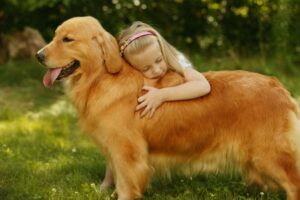Introducing a dog into your family can bring immense joy and companionship, but it’s crucial to choose the right breed that fits well with your lifestyle and household dynamics. In this article, we’ll explore the traits of the best family dogs, popular breeds for families, considerations for choosing a family dog, training and socialization tips, and essential care guidelines to ensure a happy and harmonious relationship with your canine companion.
Traits of the Best Family Dogs
Friendliness and Sociability
The best family dogs are known for their friendly and sociable nature, getting along well with all members of the household, including children and other pets.
Gentle Disposition and Patience
Family dogs should possess a gentle disposition and patience, especially when interacting with young children or elderly family members.
Trainability and Intelligence
Choosing a family dog that is highly trainable and intelligent can make the training process easier and more enjoyable, leading to a well-behaved and obedient pet.
Popular Breeds for Families
Golden Retriever
Known for their friendly and affectionate nature, Golden Retrievers are excellent family dogs, highly adaptable to various living environments and lifestyles.
Labrador Retriever
Labrador Retrievers are another popular choice for families, prized for their outgoing and playful personalities, as well as their loyalty and trainability.
Beagle
Beagles are known for their curious and friendly nature, making them great companions for active families who enjoy outdoor adventures and activities.
Bulldog
Despite their intimidating appearance, Bulldogs are gentle and affectionate dogs, known for their loyalty and devotion to their families.
Poodle
Poodles are highly intelligent and versatile dogs, available in various sizes, making them suitable for families of all sizes and lifestyles.
Considerations for Choosing a Family Dog

Size and Energy Level
Consider the size and energy level of the dog breed you’re interested in, ensuring it aligns with your family’s activity level and living space.
Allergies and Shedding
If family members have allergies, choose a hypoallergenic dog breed with minimal shedding to reduce allergens in the home.
Lifestyle and Living Space
Take into account your family’s lifestyle and living space when choosing a family dog, ensuring it fits well with your daily routines and accommodations.
Training and Socialization
Importance of Early Training and Socialization
Start training and socializing your family dog from a young age to instill good manners and behaviors, as well as to promote positive interactions with people and other animals.
Positive Reinforcement Techniques
Use positive reinforcement techniques such as treats, praise, and rewards to encourage desirable behaviors and discourage unwanted behaviors in your family dog.
Caring for a Family Dog

Exercise and Mental Stimulation
Provide regular exercise and mental stimulation for your family dog to keep them physically and mentally healthy, including daily walks, playtime, and interactive toys.
Grooming and Hygiene
Maintain your family dog’s grooming and hygiene by brushing their coat regularly, trimming their nails, and cleaning their ears and teeth to prevent dental issues and infections.
Veterinary Care and Vaccinations
Schedule regular veterinary check-ups and vaccinations for your best family dogs to ensure they remain in good health and are protected against common diseases and parasites.
FAQs About Family Dogs
-
What is the best age to bring a dog into a family with young children?
- It’s recommended to wait until children are old enough to understand how to interact safely and respectfully with a dog, typically around five years old.
-
How can I help my new family dog adjust to their new home?
- Provide a comfortable and safe environment for your new best family dogs, establish a routine, and give them time to acclimate gradually to their new surroundings.
-
Are certain dog breeds better suited for families with allergies?
- Yes, hypoallergenic dog breeds such as Poodles, Bichon Frises, and Maltese are less likely to trigger allergies in sensitive individuals.
-
What should I do if my family dog exhibits behavioral issues?
- Consult with a professional dog trainer or behaviorist to address any behavioral issues and develop a training plan tailored to your dog’s needs.
-
How can I ensure my family dog remains healthy and happy throughout their life?
- Provide regular exercise, mental stimulation, proper nutrition, veterinary care, and plenty of love and attention to ensure your best family dogs well-being and happiness.
Conclusion
In conclusion, choosing the best family dogs involves considering factors such as temperament, size, energy level, and compatibility with your best family dogs lifestyle and living space. By selecting a breed that possesses the traits of friendliness, gentleness, and intelligence, and providing proper training, socialization, and care, you can enjoy a rewarding and fulfilling relationship with your canine companion for years to come.



[…] Cane Corso dog, a majestic and powerful breed, is renowned for its impressive stature and unwavering loyalty. […]